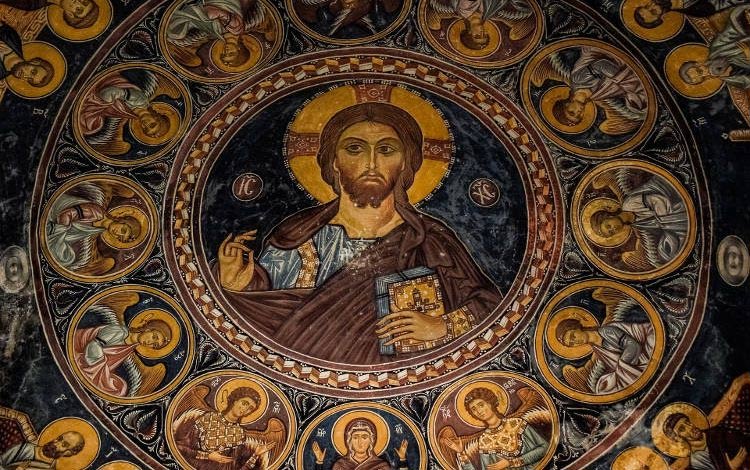
After the “Litany of Peace” in the Divine Liturgy, there are three “Antiphons” which are sung. These are selections from the Psalms, to which are added the Beatitudes of the Lord. The Typikon defines precisely which Psalms and verses will be sung, so that their content is in some way related to what the Church is commemorating that day. The most commonly used are the two doxological Psalms 103 [102 LXX]: "Bless the Lord, O my soul: and all that is within me, bless his holy name…" and Psalm 146 [145 LXX]: "Praise the Lord, O my soul. While I live I will praise the Lord: I will sing praises to my God while I have my being...". They are called Antiphons, because the verses are traditionally sung one after another by two choirs. The faithful are also encouraged to participate and sing these Psalms in low voices. The Typikon establishes which verses are added at the end according to the day: "Through the prayers of the Theotokos, Savior, save us" in the first Antiphon and "Save us O Son of God…" in the second.
With these antiphons, the Church demonstrates her strong awareness of the fact that Christ is the Savior and Redeemer. The Church receives courage from the Most Holy Theotokos, and She is the one who grants it to the entire Church. This is why we ask for Her intercession: Through the prayers of the Theotokos, Savior, save us". Lord, You are the one who saves us, as there is ”no salvation in any other, for there is no other name under heaven given among men by which we must be saved.” (Acts 4:12). It is with this assurance that Christ is Savior and Redeemer that the Orthodox Church asks for the intercession of the Blessed Mother of the Lord.
In the second antiphon we sing: "Save us O Son of God...". That is, save us who sing to You Alleluia. Alleluia means "bless the Lord," and we as a people are a generation of “seekers of the Lord.” We live as an example to the world of belief in the Lord as the only Savior and Redeemer, and that it is only by His grace that we can truly live. We put our hope and trust in God, with the certainty of His triumphant victory at the end of history.
Let us not forget that once upon a time we humans had turned away from God. But through the Incarnation of our Lord, we were given a second chance to once again experience the Paradise of God's love. This time with more awareness, redeemed and resurrected, in the Resurrection and triumph of Christ.
That is why in the Church we all sing together, as a united community, firm in the belief that the Grace of our Lord Jesus Christ is what gives us the opportunity to hope for our salvation.
The first two antiphons, then, are there in order to fill us with optimism - to help us enter the new world of God's love, to see everything that happens in our lives in the spirit of the Gospel of Christ (rather than fruitless human reasoning which causes anxiety).
To the second antiphon is added a hymn inspired by the emperor Justinian in the 7th century: "The only begotten Son...". This wonderful hymn briefly describes the mystery of the divine economy of salvation.
”Only-Begotten Son and Immortal Word of God..." is sung because He existed always in all His divine glory and majesty, and at some point in history He descends and is begotten "from the Holy Spirit and Mary the Virgin" - and becomes a man, although He is "in the Holy Trinity, equal to the Father and the Holy Spirit" spiritually. He enters this world out of love to take on human nature, and thus enables every human being to participate in this new life that Christ brings.
So this hymn includes in very few lines the whole mystery of the divine economy for the redemption of the human race. The Antiphons, with their enthusiastic and glorious character, are offered by all Christians together, tasting the joy of their union with Christ, which will be fully realized by receiving the Divine Body and Blood of Christ in Holy Communion.
After the first and second Antiphons, the Deacon repeats the so-called Small Litany: -
- "Again and again, in peace, let us pray to the Lord...".
- "Help us, save us, have mercy on us, and protect us, O God, by Your grace…".
- "Commemorating our most holy, pure, blessed, and glorious Lady, the Theotokos and ever-virgin Mary…".
We often repeat this Small Litany in the Divine Liturgy and in almost all the daily Holy Services, and it is easy to understand why. In short, it reflects on everything we need as Orthodox Christians: strength, protection, mercy, salvation and the Grace of God.
With each Small Litany the Deacon prays, the Priest bows and offers a Prayer. After the first Antiphon, the priest prays to the Lord to beseech the faithful who have gathered in the holy House of God, that He may generously grant them His limitless Mercy and Grace.
With the next Prayer after the Second Antiphon, the Priest remembers the promise of the Lord (that where two or three believers are gathered in His Name to pray, He Himself will be there), asking Him to grant everything that the believers ask for, according to their needs. The prayer also asks that all are granted the awareness of the Truth of the Gospel, and in the life to come to be given the joy of eternity.
With this, the Antiphons are completed.





